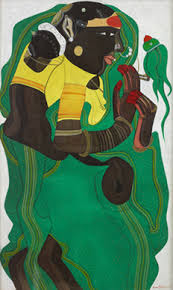An encounter
with Death
S.K. Pottekatt was down and out in
London. He had traveled non-stop for fourteen months through different
continents and landed up in London, broke. He had just enough money for his
voyage from London to Bombay. He had to wait and the cost of living in London was high. His
reserve was sufficient only for a month’s stay. The passenger ship was heavily
booked and that too leaving the English shores after a time-gap.
Pottekkatt did a clever move. He met
V.K.Krishnamenon, the Indian High Commissioner in
London. He had carried an introductory letter too. Menon lived in the mezzanine
floor of the palatial building leaving the main floor-area to his deputy. Menon
used to browse through files till two o’clock in the morning. His office hours
started at 7.30 am. In spite of the grueling grind, Menon didn’t accept even a
penny as salary.
Pottekkatt was introduced as a writer
and he sought Menon’s help in publishing his books translated into English.
Interestingly, it was Krishna Menon who started Penguin Pelican Publishing
house with an English friend in 1935. Graciously enough, Menon agreed to this
proposal and asked for the manuscript! That was a shot in the arm. Pottekkatt lost
no time in soliciting Menon’s help for a passage to India. Menon obliged. He
rang up one Mr.Ranganathan, Head of Indian Commerce Dept. in London and asked
him to do the needful.
Overjoyed, Pottekkaatt made a
bee-line to Ranganathan’s office. However, luck was not in favour. The nearest
passage was months away. Pottekkatt didn’t have money to pull on.
Can you
embark on ‘Indian Enterprise’,a cargo
ship? Ranganathan asked.
Pottekkatt was ready for anything. In
fact, he didn’t have a choice.
But there is
one condition. You can’t smoke anywhere on the ship. Its cargo are ammunition
and explosives.
That
didn’t pose a problem to Pottekkatt. In fact, he wanted to quit his smoking
habit and this would be a god-sent opportunity for doing so.
Next
morning, at the hotel lounge, an aged Pakistani gentleman bumped into
Pottekkatt. He was a business man and a globe-trotter.
Don’t you want to see more countries,
brother?
Yes
but I don’t have any money on me. Pottekkatt was frank.
No issues. You can still visit
France, Switzerland, Italy, Yugoslavia, Bulgaria and Turkey.
That’s the Orient Express. You cross the desert in a truck to reach Iraq. From Basra (Iraq), one takes a small
voyage through Persian Gulf to Bombay.
The
cost would be much less than that of the ammunition ship. Time would be
curtailed as well. The total duration of the voyage would be twenty-one days
whereas the Orient Express based
itinerary took only fifteen days.
The
proposal went straight to Pottekkatt’s head! He was a born traveler, after all
!
He
immediately started collecting transit visas of the respective countries.
However,
at the back of his mind he was troubled by his assurance that the he gave to
Ranganathan. If the cargo ship arrived, he would immediately ring up
Pottekkatt. In order to avoid such an eventuality, Pottekkatt would leave his
hotel early and wander through London streets. Moreover, he had to arrange for
the transit visa from the Yogoslavian consulate who were rigid and unfriendly.
They suddenly declared that Pottekkatt’s application was sent to their HQ in
Belgrade and it would take time. Still there was no guarantee that the outcome
would be positive. Denial of transit visa was a common affair.
In
a moment’s time, Pottekkatt’s high hopes were razed to ground. There was no
other go other than dropping the Orient Express plan. Pottekkatt was back to
square one. The only option left for him was to go and meet Ranganathan.
Naturally,
he cold-shouldered Pottekkatt.
Where were you, Mister? We telephoned
umpteen times…
See, I arranged a passage for you on His
Excellency’s request. Finally when it was ready, you were nowhere in sight.
Pottekkatt
started an apology spree. He desperately needed a berth in the cargo ship.
No
use, a bad news was in store. The ammunition and gunpowder ship had left London
the previous day.
Pottekkat
was flabbergasted. It was his seventeenth day in London waiting for a passage.
On
the twenty-third day, as he was browsing newspaper at the hotel-lounge, a news
item caught his attention.
Cargo
ship ‘Indian Enterprise’ explodes and sinks in Red Sea. 74 out of 75 perished.
Noor Hussain who escaped had gone to the upper-deck to smoke a cigarette.
Pottekkatt
rushed to his room and took out his diary. There was the description of a dream
…in which his late father visited Pottekkatt, embraced him and cried nonstop.
Pottekkatt too cried. He was woken up in his sleep, still sobbing.
 | |
| Catherene La Rose |
He
had gone to Ranganathan’s office to arrange for his voyage the previous day!
Pottekkatt immediately rushed to meet Ranganathan in his office. Ranga didn’t utter a word and gave his
customer a close embrace. Pottekkatt’s passage was
cleared in a ship named Jal Azad in
two day’s flat!
***************









